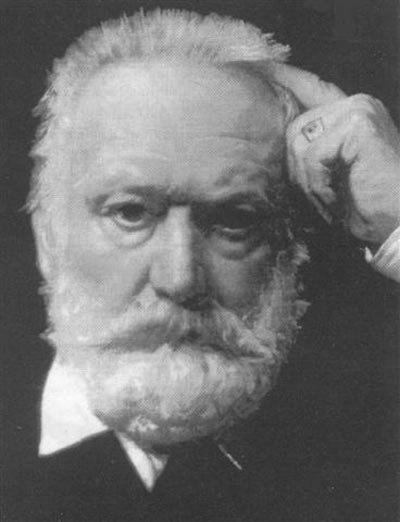
Victor-Marie Hugo was born in Besançon as the son of Joseph-Leopold-Sigisbert Hugo and Sophie Trebuchet. Hugo’s father was an officer in Napoleon’s army, an enthusiastic republican and ruthless professional soldier, who loved dangers and adventures. After the marriage of his parents had collapsed, he was raised by his mother. In 1807 Sophie took her family for two years from Paris to Italy, where Leopold served as a governor of a province near Naples. When General Hugo took charge of three Spanish provinces, Sophie again joined her husband. Sophie’s lover, General Victor Lahorie, her husband’s former Commandin Officer, was shot in 1812 by a firing-squad for plotting against Napoleon.
From 1815 to 1818 Hugo spend in the Pension Cordier in Paris, but most of the classes of the school were held at the College Louis-le Grand. He began in early adolescence to write verse tragedies and poetry, and translated Virgil. Hugo published his first collection of poems, Odes Et Poesies Diverses (1822). It gained him a royal pension from Louis XVIII. As a novelist Hugo made his debut with Han D’islande (1823), which appeared first anonymously in four pocket-sized volumes. It was translated two years later in English and a Norwegian translation was published in 1831. The style of Sir Walter Scott labelled several of his works, among them Bug-Jargal (1826).
In 1822 Hugo married Adele Foucher (d. 1868), who was the daughter of an officer at the ministry of war. In the 1820s Hugo come in touch with liberal writers, but his political stand wavered from side to side. He wrote royalist odes, cursed the memory of Napoleon, but then started to defend his father’s role in Napoleon’s victories, and attack the injustices of the monarchist regime. General Hugo died in 1828; at that time Hugo started to call himself a baron.
Hugo’s foreword for his play Cromwell (1827), a manifesto for a new drama, started a debate between French Classicism and Romanticism. However, Hugo gained a wider fame with his play Hernani (1830), in which two lovers poison each other, and with his famous historical work Notre-Dame De Paris, which became an instant success. Since its appearance in 1831 the story has became part of the popular culture.
In the 1830s Hugo published several volumes of lyric poetry.
Hugo’s lyrical style was rich, intense and full of powerful sounds and rhythms, and although it followed the bourgeois popular taste of the period it also had bitter personal tones.
In his later life Hugo became involved in politics as a supporter of the republican form of government. After three unsuccessful attempts, Hugo was elected in 1841 to the Academie Francaise. This triumph was shadowed by the death of Hugo’s daughter Leopoldine. She had married Charles Vacquerie in February 1843, and in September she drowned with her husband. Following the 1848 revolution, with the formation of the Second Republic, Hugo was elected to the Constitutional Assembly and to the Legislative Assembly. When workers started to riot, he led soldiers who stormed barricades in brutal assaults.
When the coup by Louis Napoleon (Napoleon III) took place in 1851, Hugo believed his life to be in danger. “Louis-Napoleon is a traitor,” he had declared. “He had violated the Constitution!” Hugo fled to Brussels and then to Jersey. When he was expelled from the island, he moved with his family to Guernsey in the English Channel. Hugo’s partly voluntary exile lasted 20 years. During this time he wrote at Hauteville House some his best works, including Les Chatiments (1853) and Les Miserables (1862), an epic story about social injustice. Les Chatiments became one of the most popular forbidden poetry books.
Like other Romantic writers, Hugo was interested in Spiritism, and he experimented with table-tapping. After a number of fruitless efforts, his table gave him the final title of Les Misérables. Among Hugo’s most ambitious works was an epic poem, La Fin de Satan, a study of Satan’s fall and the history of the universe. Satan is presented more complex character than merely the embodiment of the Evil, but when Milton saw in Paradise Lost in Satan’s revolt tragic, cosmic grandeur, Hugo brings forth the horror elements. The poem was never completed.
Although Napoleon III granted in 1859 an amnesty to all political exiles, Hugo did not take the bite. Hugo’s fleeting affairs with maids and country girls inspired his Les Chansons Des Rues Et Des Bois (1865). Les Travailleurs De La Mer (1866), a story of hypocrisy, love, and suicide, became a bestseller and later two films were made of it.
Political upheavals in France and the proclamation of the Third Republic made Hugo return to France. The unpopular Napoleon III fell from power the Republic was proclaimed. In 1870 Hugo witnessed the siege of Paris. During the period of the Paris Commune of 1871, Hugo lived in Brussels, from where he was expelled for sheltering defeated revolutionaries. After a short time refuge in Luxemburg, he returned to Paris and was elected as a senator of Paris in 1876. Hugo died in Paris on May 22, 1885. He was given a national funeral, attended by two million people.

